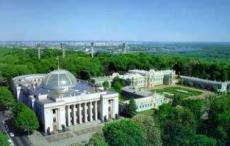- عربي
- Ukraine
- Economy
-
Investment
- Current Investment Trends
- Legal Conditions of Doing Business
- Investment Policy
- Competition
- Setting a Business in Ukraine
- Mergers and Acquisitions
- Taxation
- Import and Export
- Banks and Bank Regulation
- Convertibility and Profits Repatriation
- Currency Regulation
- Protection of Intellectual Property Rights
- Companies
- Travel to Ukraine
- About us
- Useful Sites
- Gallery
- News
Currency rates in UAH
| AED | ||
| BHD | ||
| EGP | ||
| KWD | ||
| LBP | ||
| OMR | ||
| QAR | ||
| SAR | ||
| SYP |
2015-07-06
| Kiev |  |
+32 |
| Donetsk |  |
+28 |
| Dnipropetrovsk |  |
+31 |
| Lviv |  |
+31 |
| Odessa |  |
+27 |
Political System
Politics of Ukraine take place in a framework of a presidential representative democratic republic and of a multi-party system. On August 24, 1991, Ukraine proclaimed its independence and during the referendum held on December 1 of the same year, the Ukrainian people confirmed their choice of independent development by saying "yes" to it. Leonid Kravchuk was elected the first president of a newly independent Ukraine.
Ukraine faced a multitude of very difficult tasks which had to be solved within a short period of time: a new political system had to be built; new statehood principles based on law had to be introduced; a new system of national security and defense had to be created.
In 1996 the Constitution was adopted.
General foundations of the political system
General foundations of the political system of Ukraine are defined by its Constitution. In accordance with its organic law, Ukraine is a sovereign and independent, democratic, social and jural state.
Democratic essence of the Ukrainian state is enshrined by the constitutional provisions concerning its form of government - a republic, governed by sovereignty of the people. State power is divided into legislative, executive and judicial branches, acting within their competence. The Constitution envisages the principle of political, economic and ideological diversity of social life.
The social character of Ukrainian state results in constitutional regulation of issues related to the use of property and protection of all subjects of property right, social orientation of the economy, equality of all subjects of property right before the law, and the maintenance of ecologic safety and balance within Ukraine's territory and other socially important measures.
Jural essence of the state is supported by provisions related to supremacy of law and direct action of constitutional norms. The state is responsible to the people for its activities. According to the Constitution, the main task of the state is to establish and promote human rights and freedoms.
Ukraine is a unitary state, in which its territory is integral and inviolable. The state has a single citizenship. The state language of Ukraine is Ukrainian.
State power institutions in Ukraine
The Constitution of Ukraine designates the President as the Head of State, acting on its behalf. The President is a guarantor of national sovereignty, territorial integrity, adherence to the Constitution, human and civil rights and freedoms. The President is elected by the citizens of the state on the basis of equal and direct universal suffrage through a secret vote. The term of presidential office is five years. Only a citizen of Ukraine, aged 35 or more, who was residing in Ukraine for ten years before the elections, has voting rights and speaks state language, may be elected President. President may hold his/her post no longer than two consecutive terms. More detailed...
The only legislative body of Ukraine is the Parliament - the Verkhovna Rada of Ukraine. Citizens elect delegates to the Verkhovna Rada (Supreme Council), the unicameral parliament, for five-year terms. People's deputies of Ukraine are elected by the citizens of Ukraine on the basis of equal and direct universal suffrage through secret vote. The election system is mixed - majority and proportional.
Altogether 450 deputies are elected: 225 of them are elected at single-mandate constituencies on the basis of relative majority, and another 225 are elected proportionally at multi-mandate national constituency from the lists of candidates coming from political parties and their election blocks.
The powers of people's deputies of Ukraine are established by the Constitution and laws of Ukraine. People's deputies of Ukraine may voluntarily unite themselves into deputies' groups called factions with no less than 25 members. Deputies' groups are formed both on a party and a non-party basis. Deputies' groups formed on party basis are called 'factions'. Non-party deputies may join a faction if they support the program of relevant party. Deputies' groups formed on a non-party basis unite deputies who share the same or similar views of national, social and economic development. More detailed...
The Cabinet of Ministers commonly referred to as the Government of Ukraine is the highest body of state executive power in Ukraine. The Cabinet is a collegiate body consisting of the Cabinet's presidium composed of five individual and several ministries that are represented by their respective minister.
Its actions are based on the Constitution, laws of Ukraine and presidential orders. The Government is responsible to the Verkhovna Rada of Ukraine, to which it also must report. In practice, this dependency results in parliamentary appointment of a Prime Minister. The candidate is proposed by the parliamentary coalition to the President and then the President submits an official nomination back to Verkhovna Rada for a formal approval vote.
The Prime Minister, following his appointment, nominates other members of the Cabinet (ministers) for approval by the Verkhovna Rada, except the Ministers of the Foreign Affairs and of Defense who are nominated by the President.
The Prime Minister and his Cabinet could now be dismissed only by the Parliament while formerly the President could dismiss the entire cabinet unilaterally at any time.
Parliamentary control of the Government and its reporting to the Verkhovna Rada results is parliamentary approval of government-submitted annual budget, parliamentary resolutions on fulfillment of budgetary provisions, approval or rejection of governmental program and control of government's work. More detailed...
The principles of delivering justice are declared in the Constitution of Ukraine. The most important principles are: justice is carried out solely by courts; delegation of the functions of a court as well as their assumption by other state bodies or state officials are inadmissible; extension of court jurisdiction over all legal relationships emerging in the state; judgments are binding over the entire territory of Ukraine.
The judicial system of Ukraine consists of courts of general jurisdiction and the court of constitutional jurisdiction. The courts of general jurisdiction specialize in civil, criminal, commercial, administrative cases and cases on administrative offences. The courts of general jurisdiction comprise general courts and specialized courts (commercial and administrative courts). The Supreme Court of Ukraine is the highest instance in the judicial system of courts of general jurisdiction. The Constitutional Court of Ukraine is the court of constitutional jurisdiction. More detailed...
Current political landscape
Ukraine's political landscape mirrors the country's deep divide between the West and Russia. Themain result of the parliamentary elections on 26 October 2014 was the victory of Ukraine's pro-European parties. The 'European Ukraine Coalition' took office amid mounting economic and Russian military pressure on one side, and urgent calls for reforms and 'lustration' on the other.
The first parliamentary elections since Russia's annexation of Crimea in March 2014 established a clear pro-European majority in Ukraine's parliament, reflecting increasing anti-Russian sentiments caused by Russia's 'hybrid warfare'. The pro-Western course of Prime Minister Arseniy Yatsenyuk's five-party 'European Ukraine Coalition' is counteracted by increasing Russian and pro-Russian political and military pressure in the east. With 288 of 450 seats in parliament, the pro-European parties formed a coalition government on December 2, 2014. The coalition agreement sets out a range of clear policies supported by all five parties, including on NATO membership, EU integration, the Crimea and the establishment of a new anti-corruption bureau.
The other side of Ukraine's political spectrum is clearly pro-Russian. With 3.88% of the votes, the Communist Party of Ukraine fell below the 5% threshold for the first time since it was founded in 1993 as the direct descendant of the Communist Party of Ukraine, a branch of the Communist Party of the Soviet Union. The Opposition Bloc remains the only pro-Russian opposition party in parliament. Founded in September 2014, the coalition party comprises six groups with strong ties to Yanukovych's former government.
On 2 November 2014, pro-Russian rebels held 'elections' in the self-proclaimed Donetsk and Luhansk people's republics, although the Minsk protocol stipulated that local elections were to be held in December. In both 'people's republics', the pro-Russian separatist leaders claimed victory and were sworn in as presidents. Ukraine's President Poroshenko condemned the elections as illegitimate and urged Russia 'not to recognise the so-called elections because they are a clear violation of the 5 September Minsk protocol'. EU High Representative Federica Mogherini called the vote an 'obstacle' to peace and said the EU would not recognise it. Only Moscow backed the vote, saying it 'respects the will of the people of south-east' Ukraine.
Ukraine’s constitutional reforms
1996: The first Constitution of Independent Ukraine
From 1991 to 1996, renowned international and Ukrainian legal experts worked scrupulously on the draft of a new Constitution for Ukraine, the final version of which was adopted by the Parliament of Ukraine on June 28, 2006.
This historic event marked the beginning of the stabilization of the country’s political and economic life. According to the 1996 Constitution, Ukraine was declared a presidential republic. The system of the separation of powers, set forth in the Constitution, granted strong executive powers to the President and unhindered legislative power to the Parliament.
The European Commission for Democracy through Law (the Venice Commission) praised Ukraine’s new Constitution, emphasizing that it established an effective system of checks and balances and made impossible the return to authoritarianism.
2004: Political Crisis. Amendments to the Constitution (Law No 2222)
In December 2004, the Parliament of Ukraine, faced with a deep political crisis, caused by the presidential elections, adopted the Law of Ukraine “On Introduction of Amendments to the Constitution of Ukraine” No 2222. As a result of these changes, Ukraine was transformed into a parliamentary-presidential republic, with the Parliament of Ukraine receiving much wider authorities.
In contrast with the lengthy and painstaking process of the drafting of the 1996 Constitution, the amendments introduced in 2004 look more like a political compromise than a properly done legal procedure.
The main breach of the amendments to the Constitution claimed by its opponents at that time was the ignorance the Constitutional Court, which was removed it from the mandatory procedure of legal analysis and supervision of the amendments process.
In 2005, the Parliamentary Assembly of the Council of Europe, gravely concerned with the Ukraine’s departure from the democratic procedures (i.e. the removal of the Constitutional Court from the process of the amendment of the Constitution), urged the country’s political leaders to rectify the mistakes of 2004 and by doing so to ensure the legitimacy of the constitutional changes and their compliance with the European standards.
The 2004 amendments to the Constitution have been subsequently criticized by the representatives of the ruling power, by the opposition, by prominent legal experts as well as by ordinary citizens. They have demonstrated to the world at large that in Ukraine political expediency takes priority over the Parliament’s duty to follow the prescriptions of the fundamental law.
2005-2010: Outcomes of the Constitutional Amendments 2004
From 2005 onwards, from the moment when the 2004 Constitutional amendments came into force, Ukrainian politicians, political leaders and constitutional lawyers have been locked in a series of protracted legal disputes. The Constitutional Court of Ukraine was regularly barraged by countless claims concerning the inconsistency and the incongruity of the Constitutional provisions of 2004.
As a result, Ukraine’s domestic politics descended into ruinous constitutional power struggle, which continues to mar the country’s progress and reforms even today, five years after the adoption of the amendments.
Constitutional Court. Applications history.
The first attempt to annul the constitutional amendments in the Constitutional Court was undertaken in 2007 by Yulia Tymoshenko. However, since the documents necessary for the hearing have been submitted inappropriately, the Court decided not to proceed with the hearing of the application.
On July 13, 2010, a group of Ukrainian Members of Parliament filed an application to the Constitutional Court of Ukraine, asking it to declare the 2004 Law of Ukraine “On Introduction of Amendments to the Constitution of Ukraine” No 2222 unconstitutional.
The 252 MPs requested the Constitutional Court to either return to the original Constitution of 1996, or to facilitate the adoption of new amendments, which would be adequate to the current day realities and to the needs of the Ukrainian society.
Back to the version of 1996
On October 1, 2010 the Consitutional Court of Ukraine canceled the constitutional reform, considering it unconstitutional thus reestablishing the constitutional order set forth in the original Constitution of 1996.
2014: return to 2004 amendments
Ukraine’s political landscape has changed significantly over the last 2 years. In late-November 2013, an alteration in Ukraine’s foreign policy away from signing an Association Agreement with the EU towards greater cooperation with Russia motivated massive anti-government demonstrations.
The continuous peaceful pro-Europe protests intensified and spread into more regions of Ukraine after a series of laws which suppressed freedom of assembly and speech were adopted by the Verkhovna Rada (Ukrainian Parliament) on January 16th, 2014 and signed by the President.
These laws, as well as repeated police assault against peaceful protesters, induced violent clashes between police and demonstrators, which were followed by the Prime Minister’s resignation on January 28th.
The protesters also demanded a reconsideration of the power system and a reinstate of the 2004 constitution having the President’s power limited.
On February 21nd, The Parliament also passed a law that reinstated the December 8, 2004 amendments of the constitution. This in the first and the second reading in one voting by 386 deputies.
However, the measure was not signed by the then-President Viktor Yanukovych, who was subsequently removed from office by the Parliament with 328 votes (a constitutional majority). The parliament has also called for early presidential elections on May 25th, 2014.
2015: new constitutional reform
On June 25, 2015, President Petro Poroshenko has signed decree No. 119/2015 on the establishment of a constitutional reform commission to make changes to the country’s basic law.
The commission is being established in order to develop agreed proposals to improve the Constitution of Ukraine, taking into account modern challenges and the needs of society. It is expected that this work will involve representatives of various political forces, as well as civil, domestic and international experts.
The decree of the president also specifies the status of the constitutional commission, its tasks, the procedure and form of its work. All the developments will be implemented through the issuing of presidential decrees and the submission of corresponding bills to the Verkhovna Rada.
The draft changes to the Ukrainian Constitution dealing with the decentralization of power have been submitted to the parliament sent to the Venice Commission on June 26.
Ukraine faced a multitude of very difficult tasks which had to be solved within a short period of time: a new political system had to be built; new statehood principles based on law had to be introduced; a new system of national security and defense had to be created.
In 1996 the Constitution was adopted.
General foundations of the political system
General foundations of the political system of Ukraine are defined by its Constitution. In accordance with its organic law, Ukraine is a sovereign and independent, democratic, social and jural state.
Democratic essence of the Ukrainian state is enshrined by the constitutional provisions concerning its form of government - a republic, governed by sovereignty of the people. State power is divided into legislative, executive and judicial branches, acting within their competence. The Constitution envisages the principle of political, economic and ideological diversity of social life.
The social character of Ukrainian state results in constitutional regulation of issues related to the use of property and protection of all subjects of property right, social orientation of the economy, equality of all subjects of property right before the law, and the maintenance of ecologic safety and balance within Ukraine's territory and other socially important measures.
Jural essence of the state is supported by provisions related to supremacy of law and direct action of constitutional norms. The state is responsible to the people for its activities. According to the Constitution, the main task of the state is to establish and promote human rights and freedoms.
Ukraine is a unitary state, in which its territory is integral and inviolable. The state has a single citizenship. The state language of Ukraine is Ukrainian.
State power institutions in Ukraine
The President of Ukraine
The Constitution of Ukraine designates the President as the Head of State, acting on its behalf. The President is a guarantor of national sovereignty, territorial integrity, adherence to the Constitution, human and civil rights and freedoms. The President is elected by the citizens of the state on the basis of equal and direct universal suffrage through a secret vote. The term of presidential office is five years. Only a citizen of Ukraine, aged 35 or more, who was residing in Ukraine for ten years before the elections, has voting rights and speaks state language, may be elected President. President may hold his/her post no longer than two consecutive terms. More detailed...
The Verkhovna Rada (Parliament) of Ukraine
The only legislative body of Ukraine is the Parliament - the Verkhovna Rada of Ukraine. Citizens elect delegates to the Verkhovna Rada (Supreme Council), the unicameral parliament, for five-year terms. People's deputies of Ukraine are elected by the citizens of Ukraine on the basis of equal and direct universal suffrage through secret vote. The election system is mixed - majority and proportional.
Altogether 450 deputies are elected: 225 of them are elected at single-mandate constituencies on the basis of relative majority, and another 225 are elected proportionally at multi-mandate national constituency from the lists of candidates coming from political parties and their election blocks.
The powers of people's deputies of Ukraine are established by the Constitution and laws of Ukraine. People's deputies of Ukraine may voluntarily unite themselves into deputies' groups called factions with no less than 25 members. Deputies' groups are formed both on a party and a non-party basis. Deputies' groups formed on party basis are called 'factions'. Non-party deputies may join a faction if they support the program of relevant party. Deputies' groups formed on a non-party basis unite deputies who share the same or similar views of national, social and economic development. More detailed...
The Government of Ukraine
The Cabinet of Ministers commonly referred to as the Government of Ukraine is the highest body of state executive power in Ukraine. The Cabinet is a collegiate body consisting of the Cabinet's presidium composed of five individual and several ministries that are represented by their respective minister.
Its actions are based on the Constitution, laws of Ukraine and presidential orders. The Government is responsible to the Verkhovna Rada of Ukraine, to which it also must report. In practice, this dependency results in parliamentary appointment of a Prime Minister. The candidate is proposed by the parliamentary coalition to the President and then the President submits an official nomination back to Verkhovna Rada for a formal approval vote.
The Prime Minister, following his appointment, nominates other members of the Cabinet (ministers) for approval by the Verkhovna Rada, except the Ministers of the Foreign Affairs and of Defense who are nominated by the President.
The Prime Minister and his Cabinet could now be dismissed only by the Parliament while formerly the President could dismiss the entire cabinet unilaterally at any time.
Parliamentary control of the Government and its reporting to the Verkhovna Rada results is parliamentary approval of government-submitted annual budget, parliamentary resolutions on fulfillment of budgetary provisions, approval or rejection of governmental program and control of government's work. More detailed...
The System of Judicial Authority
The principles of delivering justice are declared in the Constitution of Ukraine. The most important principles are: justice is carried out solely by courts; delegation of the functions of a court as well as their assumption by other state bodies or state officials are inadmissible; extension of court jurisdiction over all legal relationships emerging in the state; judgments are binding over the entire territory of Ukraine.
The judicial system of Ukraine consists of courts of general jurisdiction and the court of constitutional jurisdiction. The courts of general jurisdiction specialize in civil, criminal, commercial, administrative cases and cases on administrative offences. The courts of general jurisdiction comprise general courts and specialized courts (commercial and administrative courts). The Supreme Court of Ukraine is the highest instance in the judicial system of courts of general jurisdiction. The Constitutional Court of Ukraine is the court of constitutional jurisdiction. More detailed...
Current political landscape
Ukraine's political landscape mirrors the country's deep divide between the West and Russia. Themain result of the parliamentary elections on 26 October 2014 was the victory of Ukraine's pro-European parties. The 'European Ukraine Coalition' took office amid mounting economic and Russian military pressure on one side, and urgent calls for reforms and 'lustration' on the other.
The first parliamentary elections since Russia's annexation of Crimea in March 2014 established a clear pro-European majority in Ukraine's parliament, reflecting increasing anti-Russian sentiments caused by Russia's 'hybrid warfare'. The pro-Western course of Prime Minister Arseniy Yatsenyuk's five-party 'European Ukraine Coalition' is counteracted by increasing Russian and pro-Russian political and military pressure in the east. With 288 of 450 seats in parliament, the pro-European parties formed a coalition government on December 2, 2014. The coalition agreement sets out a range of clear policies supported by all five parties, including on NATO membership, EU integration, the Crimea and the establishment of a new anti-corruption bureau.
The other side of Ukraine's political spectrum is clearly pro-Russian. With 3.88% of the votes, the Communist Party of Ukraine fell below the 5% threshold for the first time since it was founded in 1993 as the direct descendant of the Communist Party of Ukraine, a branch of the Communist Party of the Soviet Union. The Opposition Bloc remains the only pro-Russian opposition party in parliament. Founded in September 2014, the coalition party comprises six groups with strong ties to Yanukovych's former government.
On 2 November 2014, pro-Russian rebels held 'elections' in the self-proclaimed Donetsk and Luhansk people's republics, although the Minsk protocol stipulated that local elections were to be held in December. In both 'people's republics', the pro-Russian separatist leaders claimed victory and were sworn in as presidents. Ukraine's President Poroshenko condemned the elections as illegitimate and urged Russia 'not to recognise the so-called elections because they are a clear violation of the 5 September Minsk protocol'. EU High Representative Federica Mogherini called the vote an 'obstacle' to peace and said the EU would not recognise it. Only Moscow backed the vote, saying it 'respects the will of the people of south-east' Ukraine.
Ukraine’s constitutional reforms
1996: The first Constitution of Independent Ukraine
From 1991 to 1996, renowned international and Ukrainian legal experts worked scrupulously on the draft of a new Constitution for Ukraine, the final version of which was adopted by the Parliament of Ukraine on June 28, 2006.
This historic event marked the beginning of the stabilization of the country’s political and economic life. According to the 1996 Constitution, Ukraine was declared a presidential republic. The system of the separation of powers, set forth in the Constitution, granted strong executive powers to the President and unhindered legislative power to the Parliament.
The European Commission for Democracy through Law (the Venice Commission) praised Ukraine’s new Constitution, emphasizing that it established an effective system of checks and balances and made impossible the return to authoritarianism.
2004: Political Crisis. Amendments to the Constitution (Law No 2222)
In December 2004, the Parliament of Ukraine, faced with a deep political crisis, caused by the presidential elections, adopted the Law of Ukraine “On Introduction of Amendments to the Constitution of Ukraine” No 2222. As a result of these changes, Ukraine was transformed into a parliamentary-presidential republic, with the Parliament of Ukraine receiving much wider authorities.
In contrast with the lengthy and painstaking process of the drafting of the 1996 Constitution, the amendments introduced in 2004 look more like a political compromise than a properly done legal procedure.
The main breach of the amendments to the Constitution claimed by its opponents at that time was the ignorance the Constitutional Court, which was removed it from the mandatory procedure of legal analysis and supervision of the amendments process.
In 2005, the Parliamentary Assembly of the Council of Europe, gravely concerned with the Ukraine’s departure from the democratic procedures (i.e. the removal of the Constitutional Court from the process of the amendment of the Constitution), urged the country’s political leaders to rectify the mistakes of 2004 and by doing so to ensure the legitimacy of the constitutional changes and their compliance with the European standards.
The 2004 amendments to the Constitution have been subsequently criticized by the representatives of the ruling power, by the opposition, by prominent legal experts as well as by ordinary citizens. They have demonstrated to the world at large that in Ukraine political expediency takes priority over the Parliament’s duty to follow the prescriptions of the fundamental law.
2005-2010: Outcomes of the Constitutional Amendments 2004
From 2005 onwards, from the moment when the 2004 Constitutional amendments came into force, Ukrainian politicians, political leaders and constitutional lawyers have been locked in a series of protracted legal disputes. The Constitutional Court of Ukraine was regularly barraged by countless claims concerning the inconsistency and the incongruity of the Constitutional provisions of 2004.
As a result, Ukraine’s domestic politics descended into ruinous constitutional power struggle, which continues to mar the country’s progress and reforms even today, five years after the adoption of the amendments.
Constitutional Court. Applications history.
The first attempt to annul the constitutional amendments in the Constitutional Court was undertaken in 2007 by Yulia Tymoshenko. However, since the documents necessary for the hearing have been submitted inappropriately, the Court decided not to proceed with the hearing of the application.
On July 13, 2010, a group of Ukrainian Members of Parliament filed an application to the Constitutional Court of Ukraine, asking it to declare the 2004 Law of Ukraine “On Introduction of Amendments to the Constitution of Ukraine” No 2222 unconstitutional.
The 252 MPs requested the Constitutional Court to either return to the original Constitution of 1996, or to facilitate the adoption of new amendments, which would be adequate to the current day realities and to the needs of the Ukrainian society.
Back to the version of 1996
On October 1, 2010 the Consitutional Court of Ukraine canceled the constitutional reform, considering it unconstitutional thus reestablishing the constitutional order set forth in the original Constitution of 1996.
2014: return to 2004 amendments
Ukraine’s political landscape has changed significantly over the last 2 years. In late-November 2013, an alteration in Ukraine’s foreign policy away from signing an Association Agreement with the EU towards greater cooperation with Russia motivated massive anti-government demonstrations.
The continuous peaceful pro-Europe protests intensified and spread into more regions of Ukraine after a series of laws which suppressed freedom of assembly and speech were adopted by the Verkhovna Rada (Ukrainian Parliament) on January 16th, 2014 and signed by the President.
These laws, as well as repeated police assault against peaceful protesters, induced violent clashes between police and demonstrators, which were followed by the Prime Minister’s resignation on January 28th.
The protesters also demanded a reconsideration of the power system and a reinstate of the 2004 constitution having the President’s power limited.
On February 21nd, The Parliament also passed a law that reinstated the December 8, 2004 amendments of the constitution. This in the first and the second reading in one voting by 386 deputies.
However, the measure was not signed by the then-President Viktor Yanukovych, who was subsequently removed from office by the Parliament with 328 votes (a constitutional majority). The parliament has also called for early presidential elections on May 25th, 2014.
2015: new constitutional reform
On June 25, 2015, President Petro Poroshenko has signed decree No. 119/2015 on the establishment of a constitutional reform commission to make changes to the country’s basic law.
The commission is being established in order to develop agreed proposals to improve the Constitution of Ukraine, taking into account modern challenges and the needs of society. It is expected that this work will involve representatives of various political forces, as well as civil, domestic and international experts.
The decree of the president also specifies the status of the constitutional commission, its tasks, the procedure and form of its work. All the developments will be implemented through the issuing of presidential decrees and the submission of corresponding bills to the Verkhovna Rada.
The draft changes to the Ukrainian Constitution dealing with the decentralization of power have been submitted to the parliament sent to the Venice Commission on June 26.




